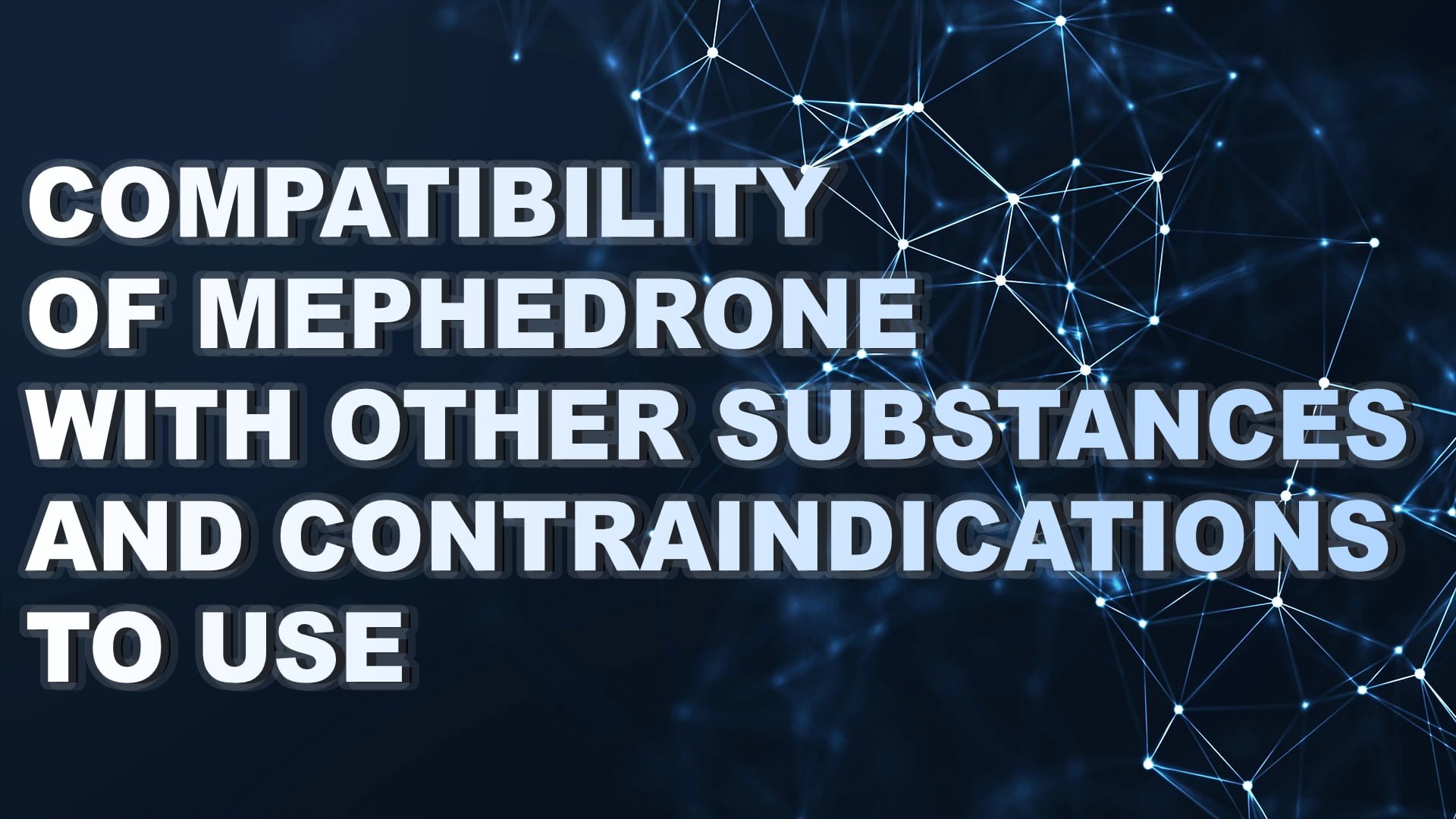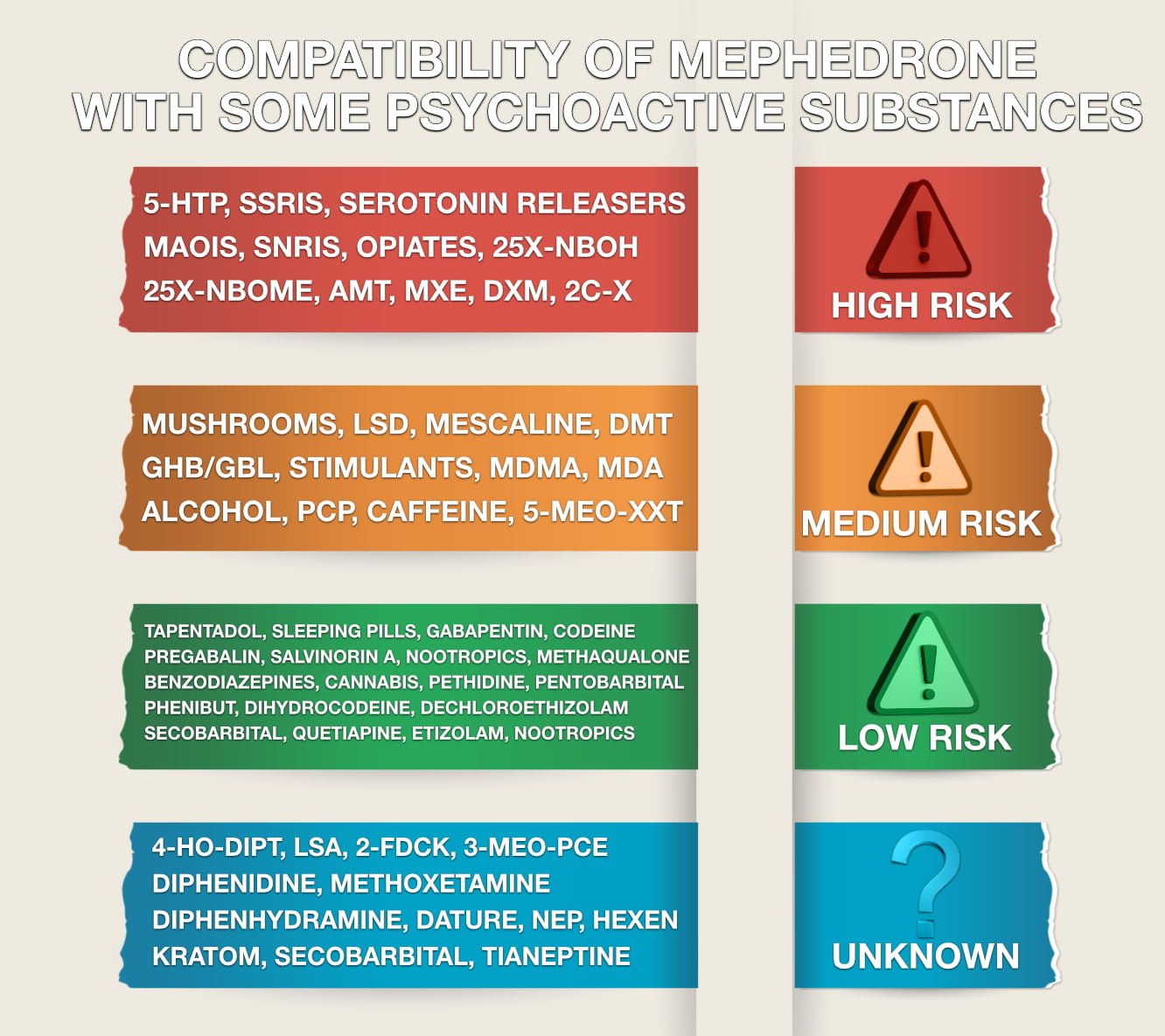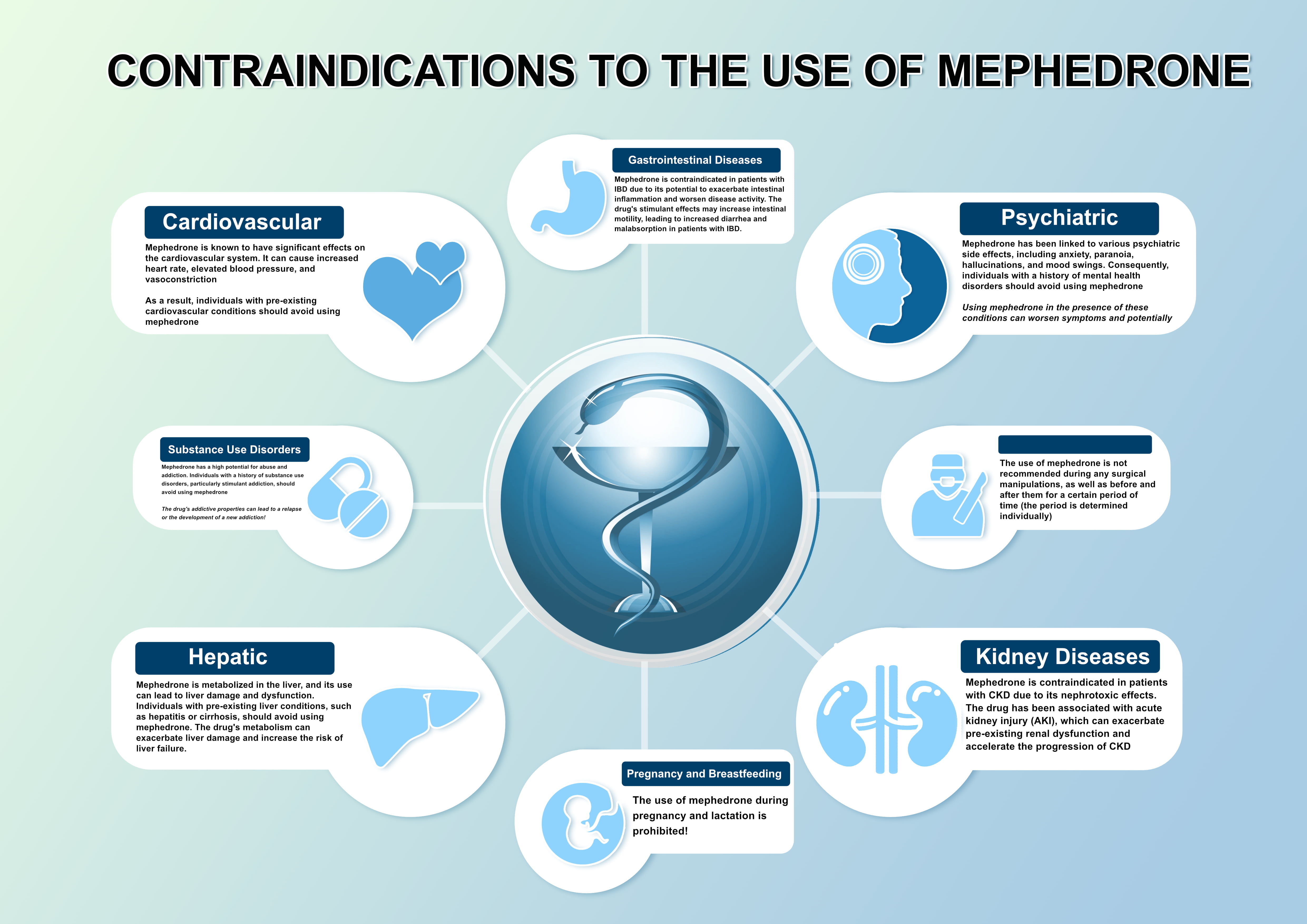The use of psychoactive substances has been a part of human culture for centuries, with individuals seeking altered states of consciousness for various reasons, including recreation, self-exploration, and spiritual growth. Mephedrone, a synthetic cathinone, has gained popularity in recent years as a recreational drug due to its stimulant and empathogenic effects.
The compatibility of mephedrone with other drugs and psychoactive substances is an important area of research because the combination of substances can lead to potentially dangerous interactions. These interactions can lead to increased toxicity, adverse side effects, and even life-threatening situations.
Knowing the contraindications to mephedrone use is integral to the harm reduction aspect of a user because if there are contraindications, mephedrone use can lead to overdose, cardiovascular dysfunction, and other complications.
The purpose of this publication is to tell you about the compatibility of mephedrone with various substances and contraindications for its use. We have described the potentially dangerous interactions of mephedrone with various drugs and given a list of pathologies in which it should not be used. Thus, you will be fully informed in this area, you can significantly reduce the risk to your health and avoid undesirable consequences for your body.
Compatibility of mephedrone with other psychoactive substances or medications
-
When using mephedrone together with drugs of FDE-5 inhibitors group, the probability of side effects of both substances increases, most often: pronounced pain in the head of spastic nature, nausea. The probability of developing severe critical conditions is low.
-
When mephedrone is used in conjunction with marijuana, there is a likelihood of increased blood pressure, headaches, fine tremors, dry mouth. The likelihood of developing severe critical conditions is low.
-
When mephedrone is used with neuroleptics/tranquilizers, there is a high probability of leveling out the main effects of mephedrone. The probability of developing severe critical conditions is low (when there are no contraindications to taking neuroleptics).
-
Mephedrone use is not recommended during pharmacological therapy with antibacterial, antiviral and antifungal drugs, hormones, anticoagulants.
-
The combined use of mephedrone with iMAO and SSRIs increases the risk of serotonin syndrome.
-
The combined use with 25x-NBOMe and 25x-NBOH is not recommended due to the high risk of acute coronary syndrome, severe psychosis.
-
The use of mephedrone together with LSD does not have a “desirable” effect, since mephedrone changes the psychedelic properties of LSD, however, there are some sporadic cases of positive reviews.
-
The combination of mephedrone with MXE, MDMA, DXM leads to an increase in incidence of complications associated with severe side effects, such as persistent increase in blood pressure, hyperthermia, neurotoxicity, ischemic attacks of the brain, acute coronary syndrome.
-
The combined use of mephedrone with alcohol is a potentially dangerous combination due to an increase in the duration of the psychostimulating and euphorogenic effects of mephedrone and a decrease in the degree of alcoholic intoxication, which contributes to the uncontrolled consumption of a large amount of these substances, exposing users to an increased risk of acute intoxication.
-
The use of mephedrone with ketamine (in low doses) together is a popular combination. The risks of developing critical conditions are medium or low, and the effect of low doses of ketamine makes the experience of using mephedrone more “hallucinogenic” and “smoothes” the undesirable post-effects of mephedrone at the comedown from the trip.
-
The combined use of mephedrone and opioid receptor agonists is not recommended.
In order to remember the main points on the subject of “undesirable combinations with mephedrone” remember the phrase: “non-ADIOS”. This easy rule has its own deciphering and once you remember it, you will know what you cannot combine mephedrone with.
The “non-ADIOS” rule:
-
non-Alcohol – not recommended for use with alcohol.
-
non-Dissociatives – not recommended for use with dissociatives.
-
non-iMAO – not recommended for use with monoamine oxidase inhibitors.
-
non-Opiates – Not recommended for use with opioid receptor agonists.
-
non-Stimulators – not recommended for use with other stimulants.
Contraindications to the use of mephedrone
Cardiovascular Contraindications
Mephedrone is known to have significant effects on the cardiovascular system. It can cause increased heart rate, elevated blood pressure, and vasoconstriction.
As a result, individuals with pre-existing cardiovascular conditions should avoid using mephedrone.
These conditions include:
-
Hypertension (high blood pressure)
-
Coronary artery disease
-
Heart failure
-
Arrhythmias (irregular heartbeats)
-
A history of heart attack or stroke
The use of mephedrone in individuals with these conditions can exacerbate symptoms and increase the risk of life-threatening complications.
Psychiatric Contraindications
Mephedrone has been linked to various psychiatric side effects, including anxiety, paranoia, hallucinations, and mood swings. Consequently, individuals with a history of mental health disorders should avoid using mephedrone.
These disorders include:
-
Anxiety disorders
-
Bipolar disorder
-
Schizophrenia
-
Major depressive disorder
Using mephedrone in the presence of these conditions can worsen symptoms and potentially trigger a psychiatric crisis.
Substance Use Disorders
Mephedrone has a high potential for abuse and addiction. Individuals with a history of substance use disorders, particularly stimulant addiction, should avoid using mephedrone.
The drug’s addictive properties can lead to a relapse or the development of a new addiction!
Hepatic Contraindications
Mephedrone is metabolized in the liver, and its use can lead to liver damage and dysfunction. Individuals with pre-existing liver conditions, such as hepatitis or cirrhosis, should avoid using mephedrone. The drug’s metabolism can exacerbate liver damage and increase the risk of liver failure. Additionally, individuals with elevated liver enzymes or abnormal liver function tests should avoid using mephedrone, as the drug can further impair liver function.
Contraindications of Mephedrone in Kidney Diseases
Mephedrone is contraindicated in patients with CKD due to its nephrotoxic effects. The drug has been associated with acute kidney injury (AKI), which can exacerbate pre-existing renal dysfunction and accelerate the progression of CKD. Furthermore, mephedrone-induced vasoconstriction may impair renal perfusion, leading to ischemic injury and worsening renal function.
Mephedrone use in patients with glomerulonephritis is contraindicated due to the potential for exacerbating proteinuria and worsening renal function. The drug’s stimulant effects may increase glomerular pressure, leading to further damage to the glomerular filtration barrier and increased proteinuria.
Contraindications of Mephedrone in Gastrointestinal Diseases
Mephedrone is contraindicated in patients with IBD due to its potential to exacerbate intestinal inflammation and worsen disease activity. The drug’s stimulant effects may increase intestinal motility, leading to increased diarrhea and malabsorption in patients with IBD.
Mephedrone use in patients with GERD is contraindicated due to the potential for exacerbating reflux symptoms and worsening esophageal inflammation. The drug’s stimulant effects may increase gastric acid production and decrease lower esophageal sphincter tone, leading to increased reflux and esophagitis.
Pregnancy and Breastfeeding
The effects of mephedrone on pregnant women and their unborn children are not well understood. However, given the drug’s stimulant properties and potential for harm, it is contraindicated for use during pregnancy. Additionally, mephedrone should be avoided by breastfeeding mothers, as it is unknown whether the drug can be passed to infants through breast milk.
The use of mephedrone during pregnancy and lactation is prohibited!
Medical manipulation and surgery
The use of mephedrone is not recommended during any surgical manipulations, as well as before and after them for a certain period of time (the period is determined individually).
Conclusion
In conclusion, mephedrone has a number of contraindications and potential health risks. Individuals with pre-existing cardiovascular or psychiatric conditions, substance use disorders, pregnant or breastfeeding women, and those taking certain medications should avoid using mephedrone. By understanding the above contraindications and the potential risks of mephedrone interactions with other psychoactive substances, we can help minimize the dangers associated with this increasingly popular drug.



